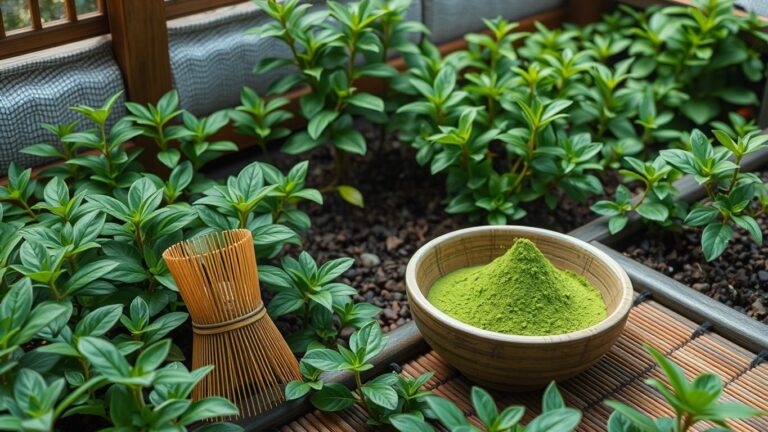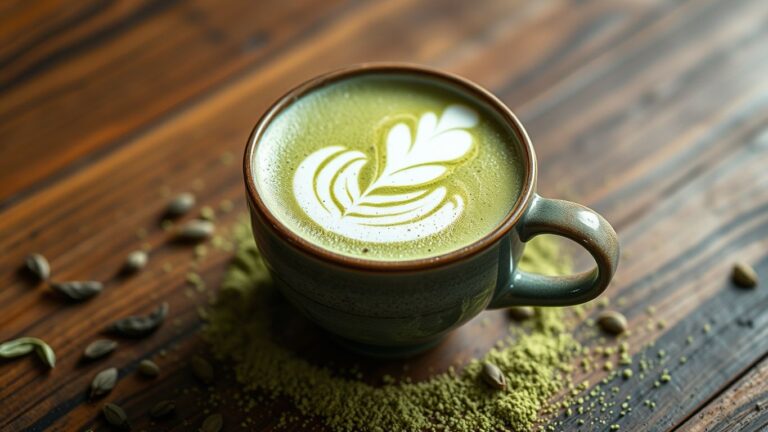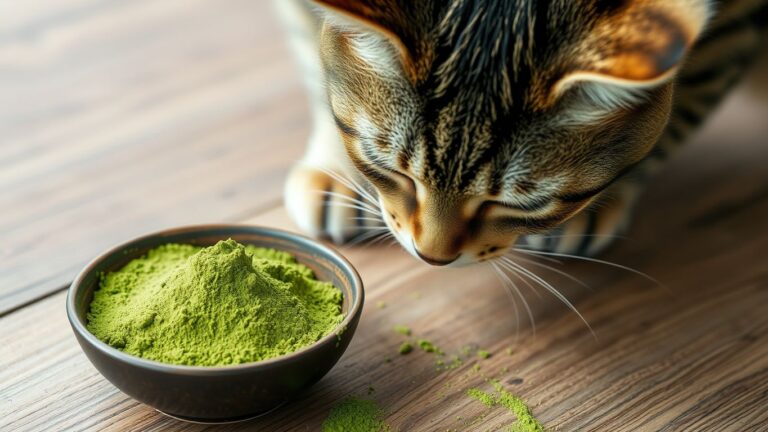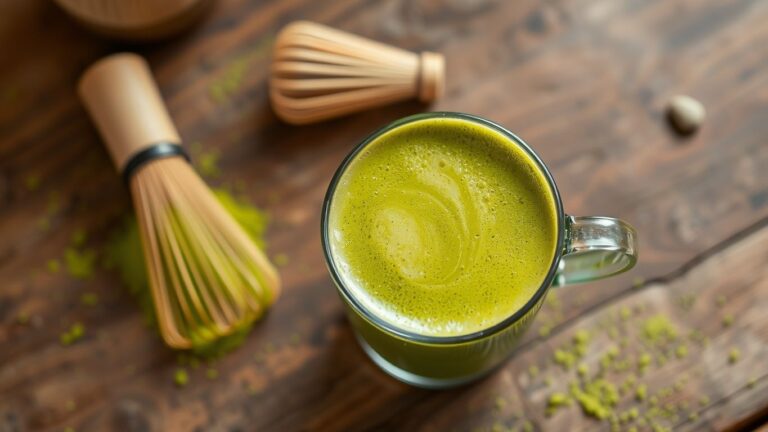Have you ever wondered how to correctly pronounce the word ‘Matcha’? Whether you’re ordering your favorite green tea latte or discussing the unique qualities of this vibrant green tea, knowing how to say ‘Matcha’ properly is important. This guide will break down the pronunciation step-by-step, help you avoid common mistakes, and explain why getting it right matters.
Key Takeaways
- The word ‘Matcha’ is pronounced as ‘MAH-cha’, with the emphasis on the first syllable.
- Avoid common mispronunciations like ‘ma-cha’, ‘mat-cha’, and ‘mar-cha’.
- Correct pronunciation shows respect for Japanese culture and enhances your credibility.
- Practice makes perfect: break down the word into syllables and practice each part.
- Listening to native speakers and using audio tools can help improve your pronunciation.
Breaking Down the Syllables of ‘Matcha’
Understanding how to pronounce ‘matcha’ correctly starts with breaking down its syllables. This will help you say it with confidence and respect for its origins.
Common Mispronunciations to Avoid
Learning how to pronounce "matcha" correctly can be tricky, but it’s important to avoid common mistakes. Here are some frequent mispronunciations and how to correct them.
‘Ma-cha’ vs. ‘Mah-cha’
One of the most common errors is saying "Ma-cha" instead of "Mah-cha." The correct pronunciation is "mah-cha". Make sure to emphasize the "ah" sound in the first syllable.
‘Mat-cha’ vs. ‘Mah-cha’
Another mistake is pronouncing it as "Mat-cha." While the "t" sound is present, it should be soft and not overly emphasized. Aim for a smooth transition between the syllables.
‘Mar-cha’ vs. ‘Mah-cha’
Some people say "Mar-cha," which is incorrect. The "r" sound should not be included. Focus on the soft "t" and the clear "ah" sound to get it right.
By avoiding these common pitfalls, you’ll be well on your way to mastering the pronunciation of "matcha."
Why Pronunciation Matters
Respecting Japanese Culture
Pronouncing "matcha" correctly shows respect for Japanese culture. This tea has deep roots in Japanese traditions, and saying it right honors those customs. It’s a small but meaningful way to appreciate the heritage behind the tea.
Enhancing Your Credibility
When you pronounce "matcha" accurately, you boost your credibility. Whether you’re chatting with friends or giving a presentation, speaking confidently about matcha makes you seem more knowledgeable. People will trust your insights and recommendations more.
Connecting with Fellow Enthusiasts
Getting the pronunciation right helps you connect with other matcha lovers. It shows that you share the same level of understanding and appreciation for this special tea. This can lead to more meaningful conversations and shared experiences.
Pronouncing "matcha" correctly isn’t just about saying a word right. It’s about showing respect, building credibility, and connecting with others who love this tea as much as you do.
Tips for Perfecting Your Pronunciation

Emphasize the First Syllable
When saying "matcha," make sure to emphasize the first syllable. The "ma" should be clear and strong, similar to the "ma" in "marvel." This helps set the tone for the rest of the word.
Practice the Soft ‘T’ Sound
The "t" in "matcha" is not as hard as in "table." Instead, it’s a soft "t" sound, almost like a quick "d." Practicing this can make your pronunciation more authentic.
Elongate the ‘CHA’ Sound
Finish with a long "cha" sound, similar to the "cha" in "charming." Make sure to maintain its clarity and avoid rushing through it.
Practicing your matcha pronunciation here are a few tips for perfecting your pronunciation of matcha: listen and repeat: find audio resources or videos online.
Remember, practice makes perfect. Repeat the word "matcha" out loud until you feel comfortable and confident with your pronunciation.
Learning from Native Speakers
Listening to Pronunciation Guides
One of the best ways to learn how to pronounce "matcha" correctly is by listening to native speakers. There are many online resources, including videos and audio clips, where you can hear the word pronounced by those who speak Japanese fluently. Hearing the correct pronunciation repeatedly will help you internalize the sounds and rhythm of the word.
Mimicking Native Intonation
After listening to native speakers, try to mimic their intonation and pronunciation. Pay close attention to how they emphasize the syllables and the subtle nuances in their speech. This practice will help you get closer to the authentic pronunciation of "matcha."
Practicing with Audio Tools
Use audio tools and apps designed for language learning to practice your pronunciation. These tools often provide instant feedback, helping you identify areas for improvement. Consistent practice with these tools can significantly enhance your pronunciation skills.
Remember, it’s not just about saying the word correctly but also understanding and appreciating its cultural significance. By pronouncing "matcha" correctly, you show respect for the heritage and customs associated with this tea.
In conclusion, learning from native speakers is a valuable step in mastering the pronunciation of "matcha." By listening, mimicking, and practicing, you can improve your skills and connect more deeply with the cultural roots of this beloved beverage.
The Cultural Significance of ‘Matcha’

Matcha in Japanese Tea Ceremonies
Matcha tea is more than just a drink; it is a cultural symbol deeply rooted in Japanese tradition. Traditionally, Matcha is used in the Japanese tea ceremony, known as Chanoyu, which emphasizes harmony, respect, purity, and tranquility. This ceremony transforms tea drinking into a work of art, where the careful preparation and consumption of Matcha tea are reflected upon with mindfulness.
The Symbolism of Matcha
Matcha holds a special place in Japanese culture. It represents a connection to nature and a moment of peace in a busy world. The vibrant green color of Matcha is not just visually appealing but also symbolizes renewal and vitality. In Japanese tea ceremonies, every step, from whisking the tea to serving it, is performed with great care and intention. This meticulous process highlights the importance of being present and appreciating the moment.
Respecting Traditions Through Pronunciation
Pronouncing ‘Matcha’ correctly is a way to show respect for its cultural roots. When you say ‘MAH-cha’ instead of ‘MATCH-ah,’ you honor the traditions and history that come with this special tea. It’s a small but meaningful way to connect with the rich heritage of Japanese tea culture.
Phonetic Breakdown of ‘Matcha’

Understanding the phonetic breakdown of ‘matcha’ can help you pronounce it correctly and confidently. Let’s dive into the details of each syllable and how they come together to form this popular word.
Practice Makes Perfect: Exercises for Pronunciation
Breaking It Down Syllable by Syllable
To master the pronunciation of "matcha," start by breaking it down into its two syllables: "ma" and "cha." Focus on each part separately before combining them. Practice makes perfect, so repeat each syllable until you feel comfortable.
Recording and Playing Back
Use a recording device to capture your pronunciation. Play it back and compare it to native speakers or pronunciation guides. This method helps you identify areas for improvement and track your progress.
Consistent Daily Practice
Set aside a few minutes each day to practice saying "matcha" out loud. Consistency is key to improvement. Over time, you’ll notice your pronunciation becoming more natural and confident.
Remember, these pronunciation games for ESL students will help them get used to tricky sounds and improve their English speaking skills. The same principle applies to mastering the word "matcha."
Overcoming Pronunciation Pitfalls

Identifying Common Errors
When learning to pronounce "matcha," it’s easy to make mistakes. One common error is saying "ma-cha" instead of the correct "mah-cha." Another frequent mistake is pronouncing it as "mat-cha," which can confuse listeners. Identifying these errors is the first step to correcting them.
Correcting Mispronunciations
To fix these mistakes, break the word into its two syllables: "ma" and "cha." Practice saying each part slowly and clearly. Remember, the "ma" should be short and crisp, while the "cha" should be soft and smooth. Repeat this process until you feel comfortable.
Building Confidence Through Repetition
Repetition is key to mastering pronunciation. Say "matcha" out loud multiple times a day. Listen to native speakers and mimic their intonation. Over time, you’ll gain confidence and be able to pronounce "matcha" correctly without hesitation.
Being able to use a few phrases in Japanese is a useful skill if you run into trouble or want to ask a favor while traveling in Japan. Similarly, pronouncing "matcha" correctly shows respect for the culture and enhances your credibility.
By focusing on these steps, you’ll overcome common pronunciation pitfalls and speak with confidence.
Becoming a Matcha Ambassador
Educating Friends and Family
As a matcha enthusiast, you have the unique opportunity to share your knowledge with those around you. Educating friends and family about the correct pronunciation and cultural significance of matcha can be both fun and rewarding. Start by explaining the basics and offering them a taste of authentic matcha.
Spreading the Correct Pronunciation
One of the most important roles of a matcha ambassador is to ensure that people pronounce it correctly. This not only shows respect for Japanese culture but also helps in maintaining the authenticity of the tea. Encourage others to say "mah-cha" instead of common mispronunciations.
Promoting Cultural Appreciation
By promoting the correct pronunciation and sharing the rich history of matcha, you help others appreciate its cultural roots. This can lead to a deeper understanding and respect for Japanese traditions. Remember, as a matcha ambassador, you are on a matcha mission to transform your passion for wellness into some super sweet perks!
Unlocking the Linguistic Puzzle of ‘Matcha’
Understanding the Origins of the Word
The word matcha comes from Japan, where it has been used for centuries. The term itself is a combination of two Japanese words: ma, meaning "ground" or "rubbed," and cha, meaning "tea." This gives us a clue about the traditional method of preparing matcha, which involves grinding tea leaves into a fine powder.
The Evolution of Pronunciation
Over time, the pronunciation of matcha has evolved, especially as it has become popular worldwide. While the traditional Japanese pronunciation is "MAH-cha," you might hear variations depending on where you are. However, sticking to the original pronunciation shows respect for its cultural roots.
Global Influence on Pronunciation
As matcha has gained popularity globally, different accents and languages have influenced how people say it. For example, in some places, you might hear it pronounced as "MAT-cha" or even "MAR-cha." Despite these variations, the most authentic pronunciation remains "MAH-cha."
Understanding the origins and evolution of the word matcha can help you appreciate its cultural significance and pronounce it correctly.
By learning the correct pronunciation, you not only show respect for Japanese culture but also enhance your credibility when discussing this beloved tea.
Embracing the Journey of Learning
Celebrating Small Wins
Learning to pronounce ‘matcha’ correctly is a journey. Celebrate each small win along the way. Whether it’s mastering the ‘MA’ sound or getting the ‘CHA’ just right, every step forward is a victory. These small achievements build your confidence and keep you motivated.
Staying Patient and Persistent
Patience is key. You might not get it right on the first try, and that’s okay. Stay persistent and keep practicing. Remember, it’s a path that leads to self-improvement and personal growth. Each attempt brings you closer to perfect pronunciation.
Enjoying the Process
Enjoy the process of learning. Make it fun by practicing with friends or using audio tools. The journey is not just about the end goal but also about the experiences and connections you make along the way. Embrace the joy of learning something new and connecting with fellow enthusiasts.
Wrapping It Up: Mastering the Pronunciation of Matcha
By now, you should feel more confident in pronouncing "matcha" correctly. Remember, it’s "mah-cha," with the emphasis on the first syllable and a soft, clear "cha" at the end. Practicing out loud will help you get the hang of it. Not only does saying it right show respect for Japanese culture, but it also makes you sound like a true tea enthusiast. So, the next time you order a matcha latte or discuss this vibrant green tea, do it with confidence and pride. Happy sipping!
Frequently Asked Questions
What is the correct way to pronounce ‘Matcha’?
The correct way to pronounce ‘Matcha’ is ‘MAH-cha.’ The ‘a’ sounds like the ‘a’ in ‘father,’ and the ‘ch’ is like the ‘ch’ in ‘charming.’
Why is it important to pronounce ‘Matcha’ correctly?
Pronouncing ‘Matcha’ correctly shows respect for Japanese culture and helps you communicate better with other tea lovers.
What are common mistakes people make when saying ‘Matcha’?
Common mistakes include saying ‘ma-cha,’ ‘mat-cha,’ or ‘mar-cha’ instead of the correct ‘MAH-cha.’
How can I practice pronouncing ‘Matcha’ correctly?
You can practice by breaking it down into syllables, listening to native speakers, and saying it out loud repeatedly.
What does ‘Matcha’ mean?
‘Matcha’ is a type of green tea powder from Japan. The word ‘Matcha’ means ‘ground tea’ in Japanese.
Where can I hear the correct pronunciation of ‘Matcha’?
You can hear the correct pronunciation by listening to pronunciation guides online or watching videos of native speakers.
Does the pronunciation of ‘Matcha’ vary in different countries?
While the correct pronunciation is ‘MAH-cha,’ it may vary slightly depending on accents and local pronunciations in different countries.
Can mispronouncing ‘Matcha’ affect how people perceive me?
Yes, pronouncing ‘Matcha’ correctly can enhance your credibility and show your respect for the culture, making a positive impression on others.






